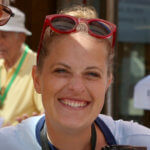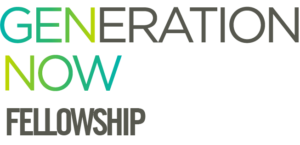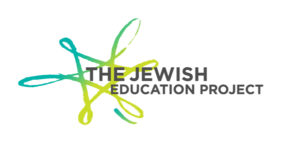Ten years later…
 Ten years ago, after being a shlicha (a counselor from Israel) at Camp Ramah in Canada for a few years and the summer Assistant Director, my husband, Nachum, and I embarked on a journey to Toronto to pursue my passion for “Ramah” and explore being a full time Jewish educator. In 2012, we decided to move to Los Angeles so I could take on the role of Associate Director at Camp Ramah in California. While we were sad to leave Toronto, we were ready for the next steps professionally and personally – and definitely ready for better weather!
Ten years ago, after being a shlicha (a counselor from Israel) at Camp Ramah in Canada for a few years and the summer Assistant Director, my husband, Nachum, and I embarked on a journey to Toronto to pursue my passion for “Ramah” and explore being a full time Jewish educator. In 2012, we decided to move to Los Angeles so I could take on the role of Associate Director at Camp Ramah in California. While we were sad to leave Toronto, we were ready for the next steps professionally and personally – and definitely ready for better weather!
We fell in love with the Ramah community in Los Angeles, with our kids’ school, and with our chevre (circle of friends) there. We had one more child and life seemed to be running smoothly. Over the years, I had tried to find opportunities for professional development but they were often offered over the summer, which did not work with three little kids and/or being away all summer.
 Last year, I finally found one that wasn’t over the summer! This opportunity was the GEN NOW fellowship, run by The Jewish Education Project (and funded generously by the Jim Joseph Foundation), which has been designed for veteran Jewish educators working with other teen Jewish educators to shape the teen engagement agendas in their communities or movements. It was the first cohort and like with any “first”. I was worried what it meant being a first time fellowhship, but I decided to apply and take the risk since, finally, something was being offered not over the summer. My three kids were now at ages that made it easier to travel and I was transitioning to a new role as the Director of Camp Ramah.
Last year, I finally found one that wasn’t over the summer! This opportunity was the GEN NOW fellowship, run by The Jewish Education Project (and funded generously by the Jim Joseph Foundation), which has been designed for veteran Jewish educators working with other teen Jewish educators to shape the teen engagement agendas in their communities or movements. It was the first cohort and like with any “first”. I was worried what it meant being a first time fellowhship, but I decided to apply and take the risk since, finally, something was being offered not over the summer. My three kids were now at ages that made it easier to travel and I was transitioning to a new role as the Director of Camp Ramah.

It seemed like the perfect time to invest in me and to practice what I preach to my staff.
Fast forward, I was accepted into the first cohort of the fellowship and, when I got the names of the nineteen other individuals in my cohort, I was blown away. I read through their bios and looked at their pictures and I was so humbled and honored to be a part of this group. I couldn’t wait to meet them all! As a Jewish educator, I feel like I usually know everyone wherever I go and it was exciting to see that there were only a couple of familiar names among them.
I saw that we would have four in-person gatherings and that our eight-day trip to Israel would be the longest amount of in-person time. I was excited to have the opportunity to go to Israel as a learner and “tourist” after being gone for ten years (although I went back twice to three times a year every year, it was always for work or personal reasons).
We had our first gathering in New York in June 2018 and it was great to meet everyone and get a sense of what the goals of the fellowship were. However, between me starting our staff week one day after the gathering and it being so much so quickly, I was really looking forward to our time in Israel to deepen the relationships and to have more opportunities for sharing. Mostly, I was anticipating trying to crack some of what has been facing us all as Jewish educators – how to enhance our Israel education efforts.
So, the summer came and went, the chagim came and went, and October 2018 was finally here. I was embarking on an eight-day trip to Israel, SOLO. No partner, no kids, no “work wives” or “work husband” – just me and my nineteen new friends. It is not easy to pick up for eight days for a trip that isn’t entirely work related, a family event, or something of that nature. It requires an extremely supportive partner at home, generous colleagues at work, and an understanding community of friends, stake holders, and more to understand the value of me being away. I was missing our annual Ramah gala honoring dear colleagues and friends of mine.
Going on this trip, I was not sure what to expect. We were asked before the trip to share if, ultimately, we are successful in Jewish education, what would that look like in 20 years. This fellowship gathered a group of twenty educators from around the U.S., drawing from diverse communities and backgrounds (BBYO, URJ, several JCCs, NCSY, Bnei Akiva, several community wide teen initiatives, Upstart, Moving Traditions, a JFCS, several BJEs, a teen philanthropy organization, and more). And, then, there was me, representing Ramah and the Conservative movement.
We were lucky to have the incredible educator, Jonny Ariel, accompany us throughout our eight days. I learned a lot about experiential education from him and I really welcomed the opportunity to be the learner; to be “the one on the other side” for a change. At the opening our week of our seminar, in a room in the Carlton hotel in Tel Aviv overlooking the beautiful Mediterranean, he opened by explaining how we – as Jews – are living in a “liminal space.” This concept helped frame the nature of our experiences during this journey.
While in Israel, we explored how various organizations and individuals are enabling teens and others to flourish. We looked at Israel as a model of how we can handle challenges and tough subject matter with our teens and turn them into honest, reflective, and challenging opportunities. We met with change agents tackling internal social challenges like Tikkun Olam Makers who, with the help of engineers, create innovative technical solutions for the physically challenged for whom the equipment they need either has not yet been invented or is not affordable. We visited with leaders of Bina: The Secular Yeshiva, whose founders decided that it was time for Torah and other parts of our rich tradition to be accessible to the chilonim (non-halachically observant) in Israel as well. We met with the creators of the hit show HaYehudim Baim who decided to take our Jewish tradition and stories and turn figures like Moses, Abraham, and Ben Gurion into human comedic individuals, just like the rest of us. We met with an Israeli social researcher/commentator, Shmuel Rosner, who is talking about a new type of “Jewsraeli” and discovering what they are connected to, moving away from, and how they are defining their own identity.
We met with Rabbi Seth Farber who is trying to push the needle on keeping Israel both Jewish and democratic while pressuring the Rabbanut (the Israeli Chief Rabbinate) to relinquish absolute control over personal status issues and the public space. He is using legal action at the level of the Supreme Court, advising secular Jews who are opposed to what they deem to be the coercive nature of marriage under the religious authorities, and supporting the Russian population who are “Jewish enough” to move to Israel under the terms of the Law of Return but not “Jewish enough” to get married in Israel.
We spoke to a charedi (ultra-Orthodox) Rabbi who is creating schools for charedi kids that will also include secular studies so that kids who may have learning challenges will not be rejected by the yeshiva system and find themselves on the streets. We met with Rabbi Michael Melchior who was one of the founders of Birthright Israel and, most recently, created the vision behind Meitarim (musical strings) schools, which have ultra-Orthodox, Orthodox, traditional, and secular students, all learning together. He was told it was impossible to achieve this in Israel and they now have 94 of these schools across the country.
We met with the incredible David Moss (who also happens to be my father), who is inspiring Jews with his creativity and love of Yiddishkeit. In East Jerusalem, we encountered a Palestinian who opened a cultural bookshop to try and prepare his people to be ready to make the right choice if and when the opportunity presents itself. And, in Gush Etzion, we met with Rabbi Shaul Yudelman and Nur Abu Awaad, a Jewish settler and West Bank Palestinian respectively, who are part of the Shorashim (roots) Center, which encourages dialogue and face-to-face encounters between settlers and West Bank Palestinians. We had a tour guide from the settlement of Alon Shvut and a tour guide from the Arab village of Wallaje.
And the list of things we did, people we spoke to, and places we were at goes on and on.
But, in our closing circle, when we were asked to look at what we wrote before this trip and share our closing thoughts, I shared these words:
First, I have immense gratitude for having had this experience. The recognition that us Jewish educators need this time to ignite our minds, to be invested in (we were treated like royals!), to be the learners for a change and, for our organizations to recognize that need, is incredible. Second, I felt a real coming of age. This year marks ten years that I have not lived physically in Israel. While my group joked that it seemed like I was the Mayor of Jerusalem, because I knew many of the people we met with from some point and time in the past (i.e. a shaliach from Ramah California drove by on the street and yelled “Ariella!” out of his window, we walked by my father in law’s hat store, we visited my father’s studio, and we went out to my brother in law’s bar). But, with all of that, I have not lived the day to day life in Israel for the last ten years. I did not fully recognize how, in a country that is “70 years young,” as Rabbi Farber called it, ten years away, creates new problems, new cultures, new identities, new movements, and new changemakers.
It suddenly clicked for me that, if the people we were meeting with were this friend’s brother and this person’s cousin that I grew up with and that they were changing the face of Israel, our group of twenty – and all those who work and support us back in the US – are the changemakers of Jewish America and, together, all of us are creating the Jewish future for Israel and the Diaspora, with our teens.
Internally, I probably knew this but I needed to go back to Israel, to stop my day to day work and to take time to learn and think, to see what is facing us as Jews, and to meet and spend meaningful time with nineteen inspiring educators, to verbalize and feel it fully.
The bookends of our trip were the shootings in Pittsburgh and the fires in California. Not easy times for us as Jews and camp professionals in southern California. But, taking the time to stop, learn, and reflect was probably the best gift I could have asked for in these challenging times.
So back to the question, “If I am ultimately successful in my efforts, what will Jewish life look like in 20 years?” I don’t think what I shared before the trip changed significantly but it definitely left me feeling challenged in some ways and extremely optimistic in other ways, particularly seeing the people in our cohort as the leaders we all are and thinking about the leaders we are all creating within our communities.